What comes next, now that today's launch attempt is off
From CNN's Jackie Wattles
SpaceX is letting the countdown clock run down a bit more and run through a bit of a rehearsal for what they'll do on the next launch attempt.
They'll put the rocket through what's called a "recycle" — taking out the super-chilled fuel and preparing for another attempt.
It's not clear when the company will try again. They do have a launch window reserved for Tuesday opening at 7 a.m. CT (8 a.m. ET), but recycling will force them to wait a bit longer, at least 48 hours.
Mission scrubbed: A pressure issue delays Starship launch
From CNN's Jackie Wattles
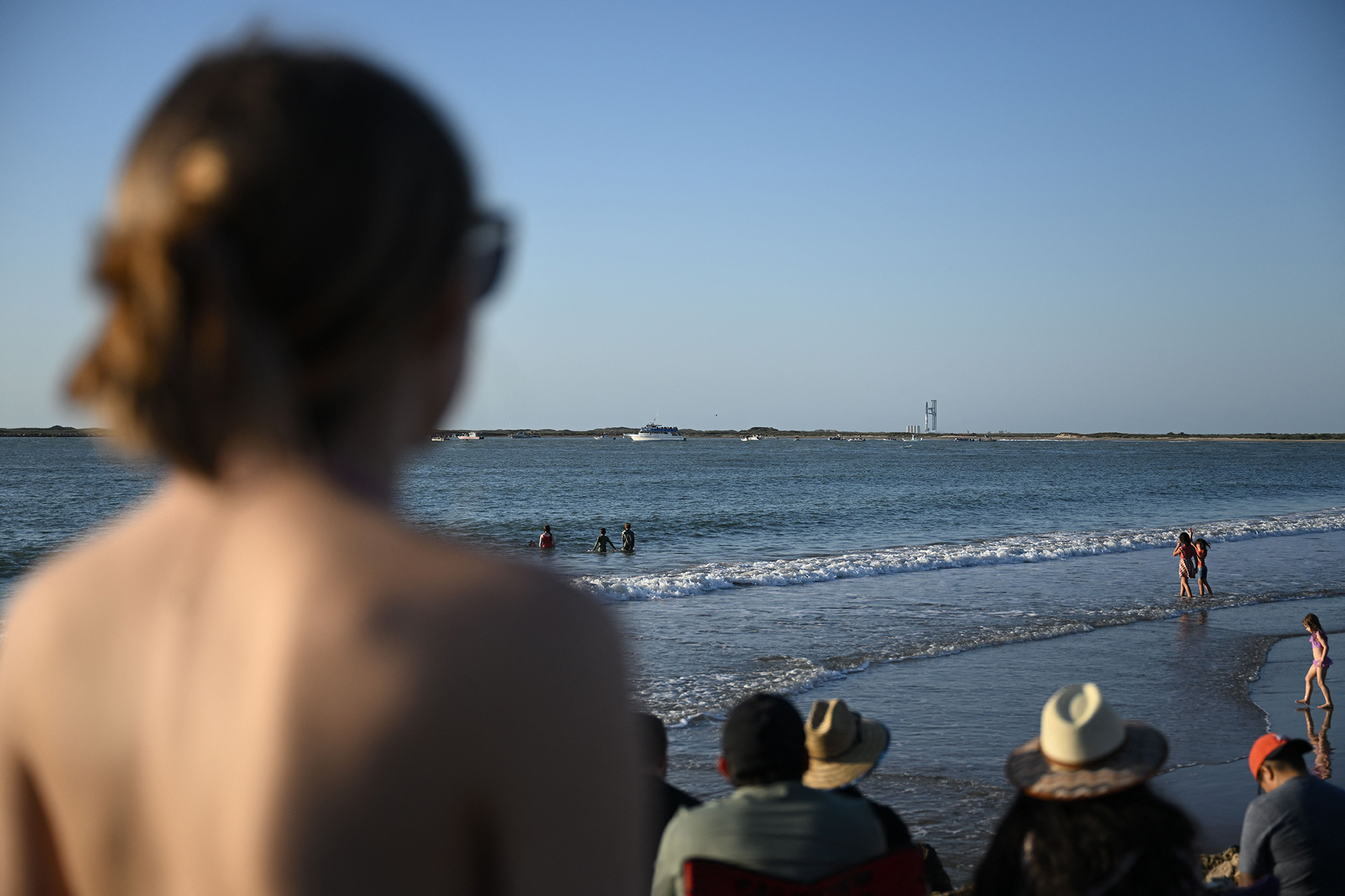 Observers on the beach gather to watch the launch of the SpaceX Starship rocket near Brownsville, Texas, on Monday April 17. (Patrick T. Fallon/AFP/Getty Images)
Observers on the beach gather to watch the launch of the SpaceX Starship rocket near Brownsville, Texas, on Monday April 17. (Patrick T. Fallon/AFP/Getty Images)Engineers tried to troubleshoot a pressurization issue with the massive Super Heavy booster. But they couldn't quite figure it out in time, and today's launch has been scrubbed.
The countdown clock had less than 10 minutes on it, with SpaceX engineer John Insprucker saying they would work to determine when they can make the next attempt.
Officials working to clear a wayward boat
From CNN's Jackie Wattles
One boat is sitting in the water near the launch site in a zone that's supposed to be off limits.
SpaceX engineer John Insprucker said on the company's live stream they are working to get the ship out of the way.
It's not uncommon: Boats actually frequently delay rocket launches by wandering into keep-out zones.
SpaceX is also working to troubleshoot a fuel pressurization issue, but that hasn't caused a delay yet.
Why does Starship have a black patch on it?
From CNN's Jackie Wattles
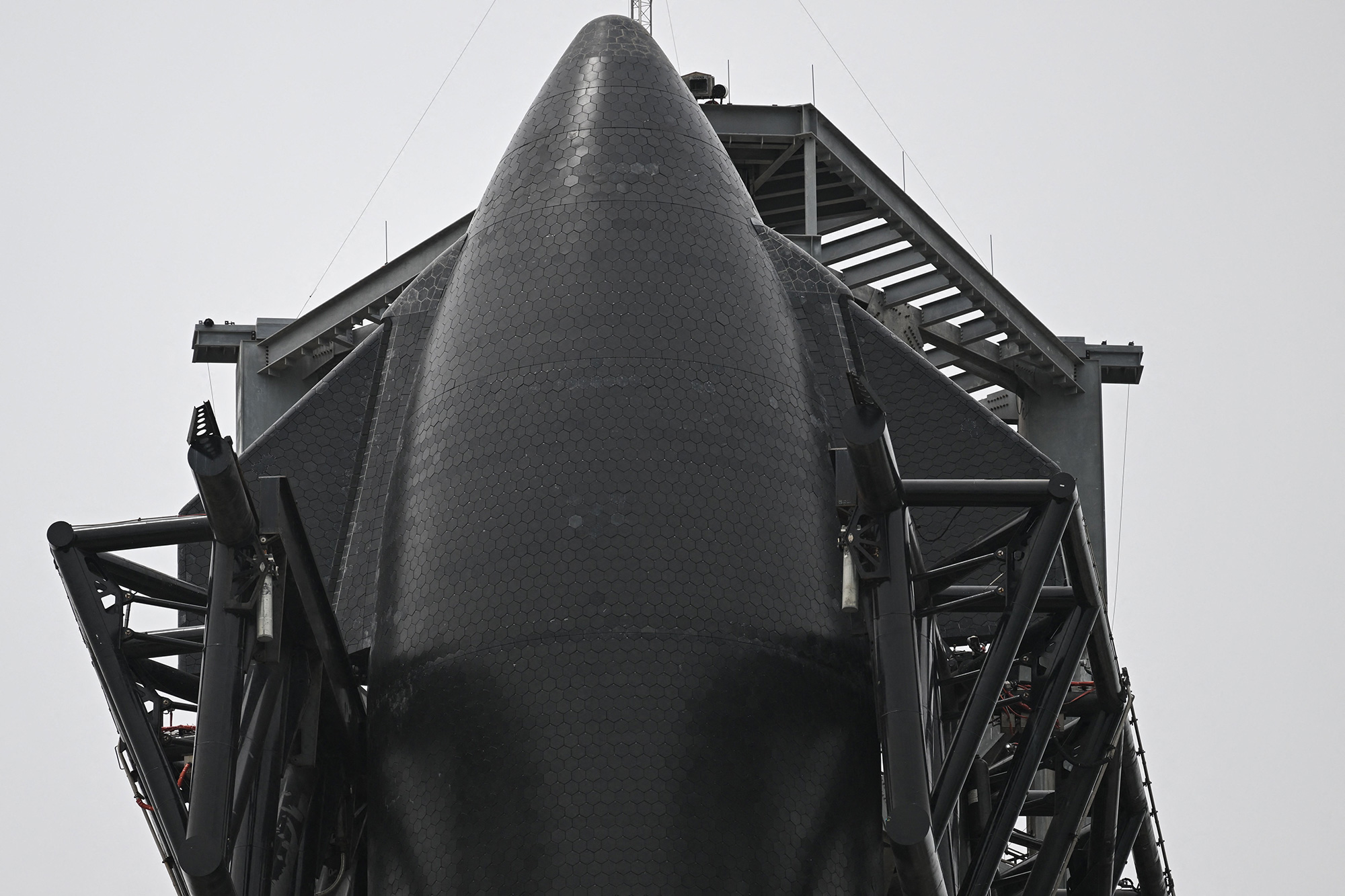 The black tiles of SpaceX's Starship are seen on the launchpad on April 16. (Patrick T. Fallon/AFP/Getty Images)
The black tiles of SpaceX's Starship are seen on the launchpad on April 16. (Patrick T. Fallon/AFP/Getty Images)The Starship spacecraft, seen sitting atop the Super Heavy booster, is covered in 18,000 hexagonal black tiles.
Those are the spacecraft's heat shields, designed to protect the vehicle as it undergoes the blazing fires that are generated as it reenters the Earth's atmosphere after the flight.
The tiles only coat one side of Starship. That's because the vehicle reenters horizontally, and the tiles only coat the belly.
What's riding on the SpaceX Starship launch
From CNN's Jackie Wattles
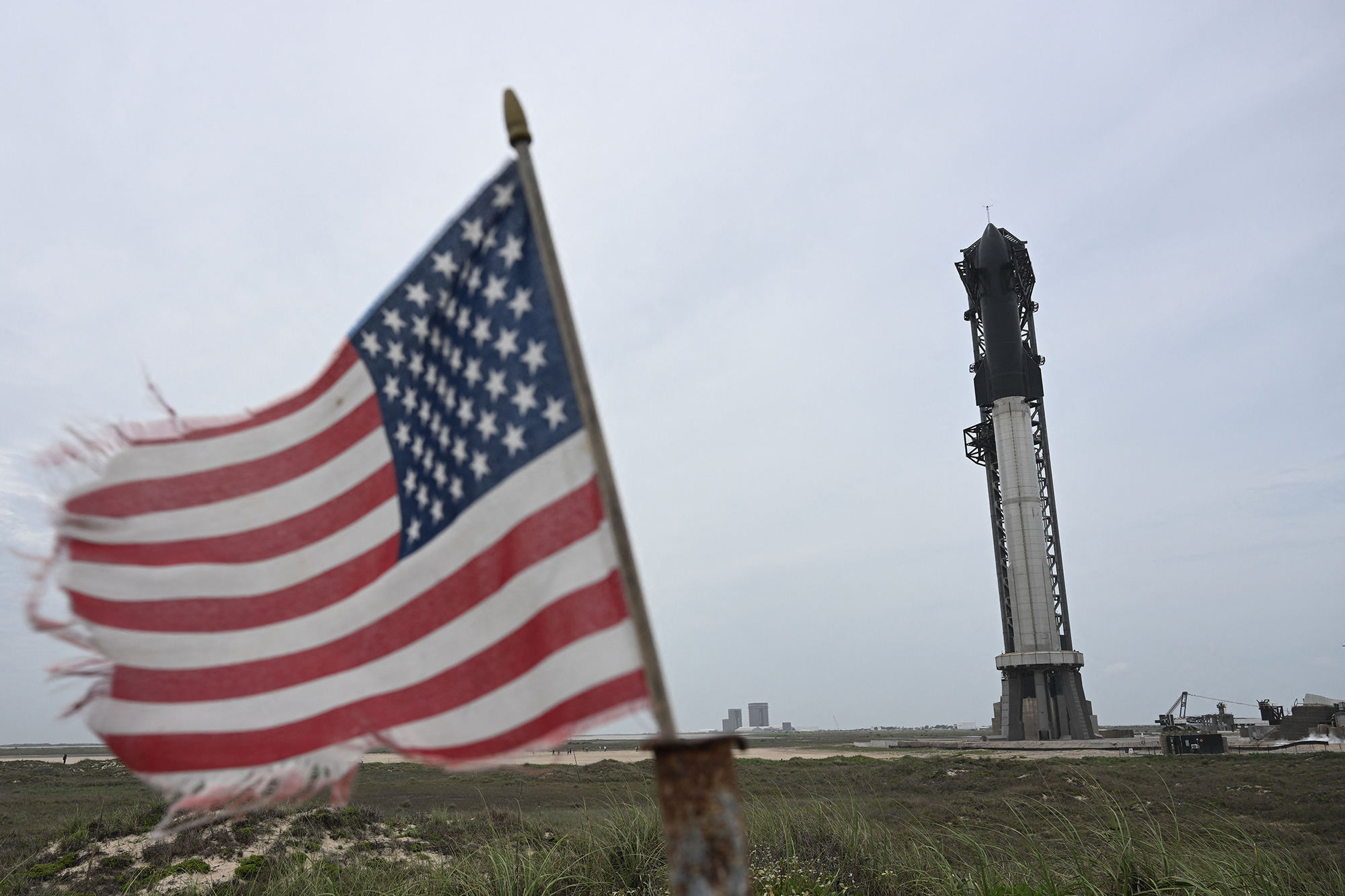 An American flag waves in the wind as the SpaceX Starship stands on the launch pad ahead of the flight test on Sunday, April 16. (Patrick T. Fallon/AFP/Getty Images)
An American flag waves in the wind as the SpaceX Starship stands on the launch pad ahead of the flight test on Sunday, April 16. (Patrick T. Fallon/AFP/Getty Images)Just a few months after NASA introduced the world to the most powerful rocket ever flown to orbit, Elon Musk’s SpaceX is prepared to set off its own creation — which could pack nearly twice the power of anything flown before.
"I guess I'd like to just set expectations low," SpaceX CEO Elon Musk said during a Twitter "Spaces" event for his subscribers Sunday evening.
If we get far enough away from the launch pad before something goes wrong, then I think I would consider that to be a success. Just don't blow up the pad.
Starship's ultimate success or failure is immensely consequential. Not only is it crucial to SpaceX's future as a company, it also underpins the United States government's ambitions for human exploration.
NASA has awarded SpaceX contracts and options worth several billions of dollars to use Starship to ferry government astronauts to the surface of the moon under the space agency’s Artemis program.
But it's not all riding on this inaugural test flight. SpaceX has long established its willingness to embrace mishaps, mistakes and explosions in the name of refining the design of its spacecraft.
In the lead-up to the first launch of the company's Falcon Heavy rocket in 2018, which held the title of the most powerful rocket before NASA's SLS took flight last year, Musk foresaw only a 50-50 chance of success.
"People [came] from all around the world to see what will either be a great rocket launch or the best fireworks display they've ever seen," Musk told CNN at the time.
The Falcon Heavy launch was ultimately successful.
If you're in Texas or Hawaii, you could see part of the launch
From CNN's Jackie Wattles
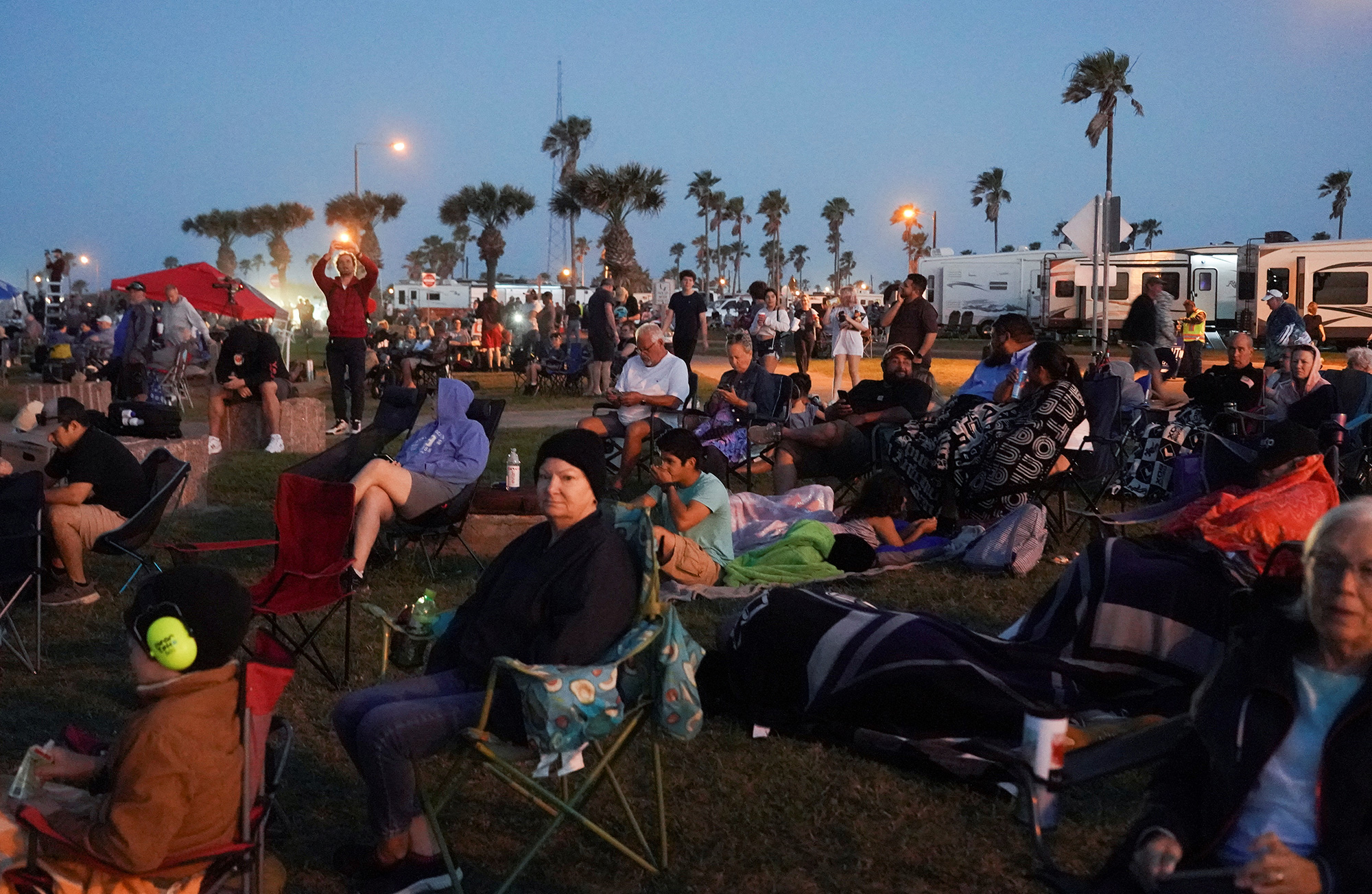 People gather before SpaceX's Starship lifts off from the company's Boca Chica launchpad on an orbital test mission near Brownsville, Texas, on Monday, April 17. (Go Nakamura/Reuters)
People gather before SpaceX's Starship lifts off from the company's Boca Chica launchpad on an orbital test mission near Brownsville, Texas, on Monday, April 17. (Go Nakamura/Reuters)SpaceX has a livestream of the Starship launch here.
Folks on the ground near SpaceX's facilities in South Texas can certainly catch an in-person glimpse. Locals are known to line the surrounding beaches in South Padre Island to watch tests, and this launch is sure to draw spectators.
SpaceX has repeatedly warned those in the area, however, to stay away from the "Keepout Zone" — the areas directly surrounding the launch site that have been deemed too close to the rocket to be safe during launch.
The "Keepout Zone" includes the coastline south of South Padre Island and stretches a few miles inland.
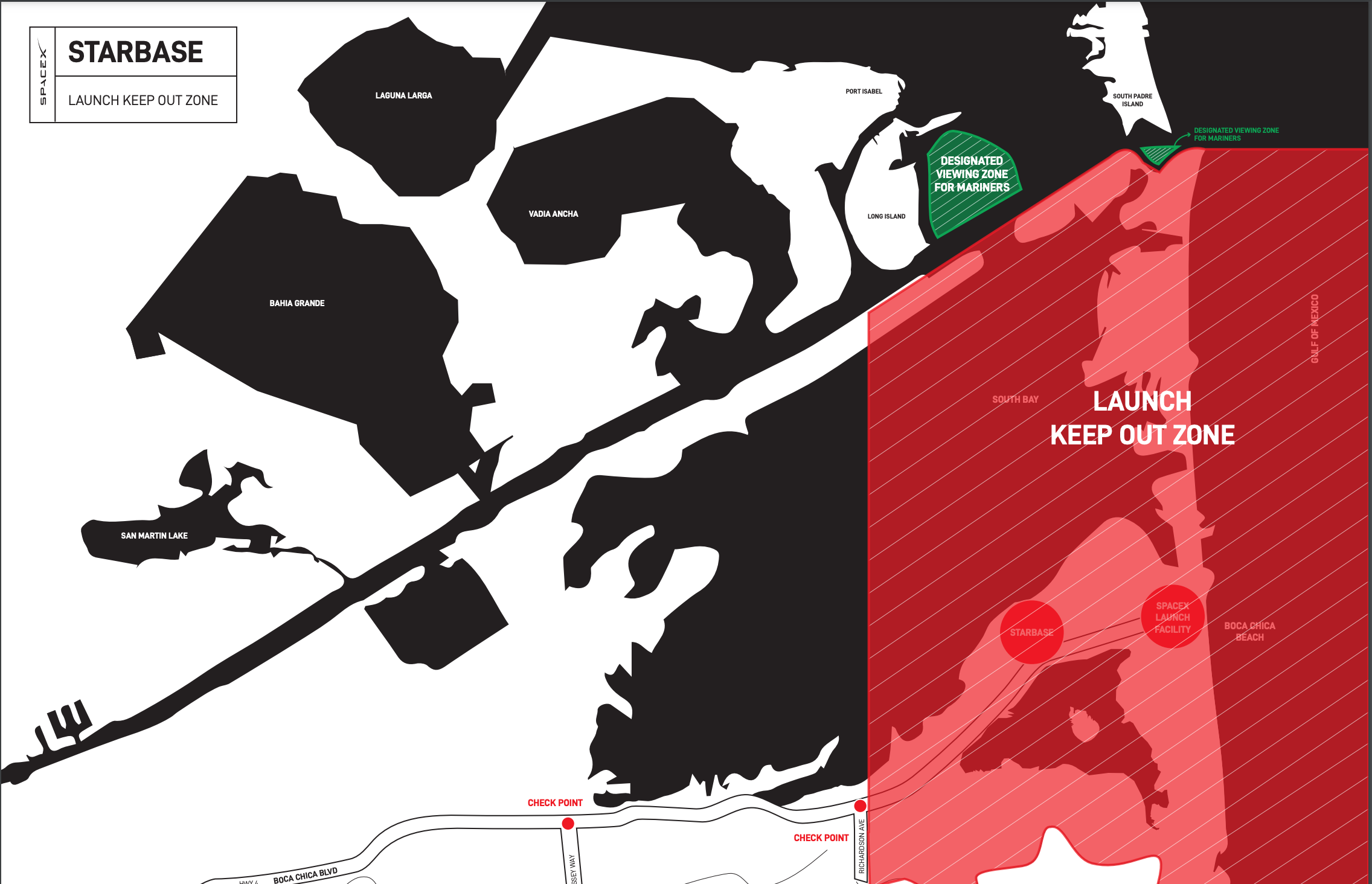
SpaceX also issued this warning:
For those around the world hoping to catch views of the rocket in flight — that may not be possible.
Dr. Marco Langbroek, a lecturer at the Department of Astrodynamics and Space Missions of Delft Technical University in the Netherlands, mapped out the rocket's trajectory and predicts it will fly through too much daylight or the shadow in Earth's atmosphere to be visible from the ground.
But, folks in Hawaii should be able to see the Starship spacecraft as it plunges back into Earth's atmosphere after the flight. The reentry process is known to cause spacecraft to light up as the intense speeds and pressure on the vehicle create a fiery blaze.
SpaceX has been testing the Starship rocket's design for years
From CNN's Jackie Wattles
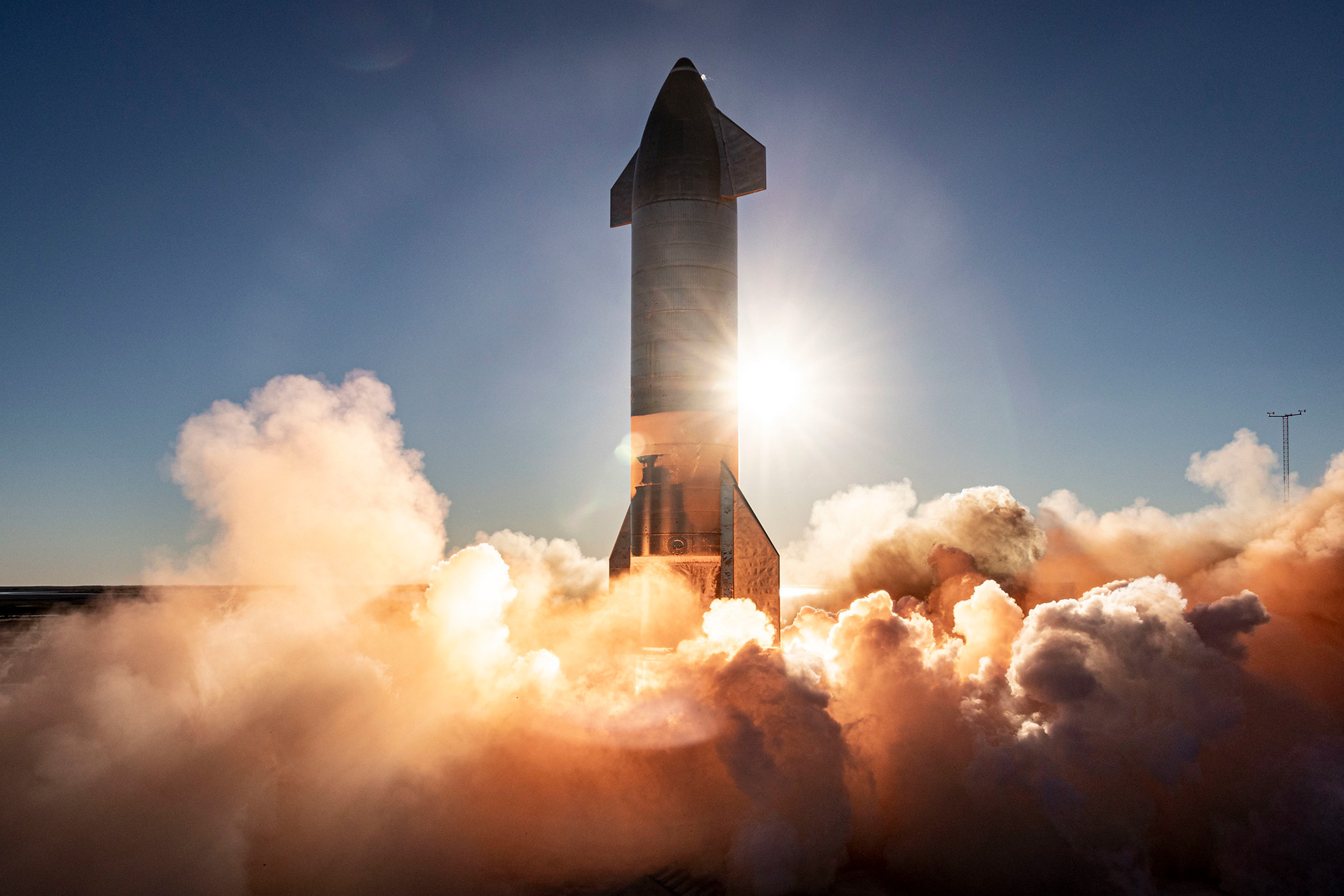 Starship SN8 during a High-Altitude Flight Test in Cameron County, Texas on December 9, 2020. (SpaceX)
Starship SN8 during a High-Altitude Flight Test in Cameron County, Texas on December 9, 2020. (SpaceX)Development of Starship has been based at SpaceX’s privately held spaceport about 40 minutes outside Brownsville, Texas, on the US-Mexico border.
Testing began years ago with brief “hop tests” of early spacecraft prototypes. The company began with brief flights that lifted a few dozen feet off the ground before evolving to high-altitude flights, most of which resulted in dramatic explosions as the company attempted to land the craft upright.
One suborbital flight test in May 2021, however, ended in success.
Since then, SpaceX has also been working to get its Super Heavy booster prepared for flight. The Super Heavy booster is a gargantuan rocket that houses 33 engines. The Starship spacecraft sits atop the booster during launch and is designed to break away after the booster expends its fuel to finish the mission.
Fully stacked, Starship and Super Heavy stand about 400 feet tall.
This will be SpaceX’s first attempt to put Starship into orbit, building on the yearslong testing campaign to work out the design of the rocket.
SpaceX Starship is targeting 9:20 a.m. ET for liftoff
From CNN's Jackie Wattles
SpaceX is eyeing a takeoff time of 8:20 a.m. CT (9:20 a.m. ET).
Before liftoff, the company has to load many thousands of pounds of fuel need to be loaded with millions of pounds of propellant. It's powered by methane and super-chilled liquid oxygen.
That process began just before 7 a.m. ET.
Is today the day? Here's a look at the factors that will determine SpaceX's Starship launch
From CNN's Jackie Wattles
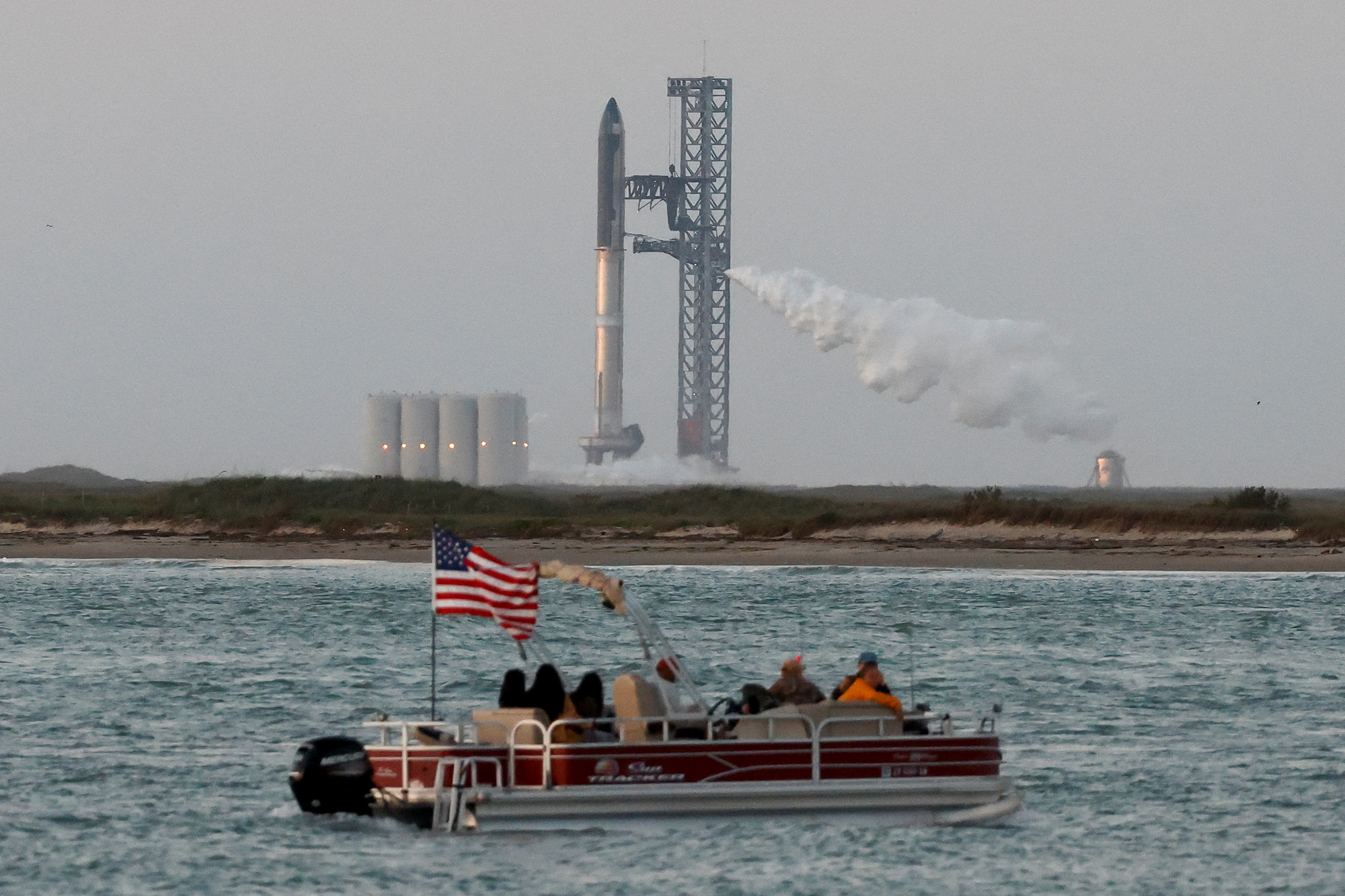 SpaceX's Starship is seen ahead of its lift off from the company's Boca Chica launchpad on an orbital test mission near Brownsville, Texas, on April 17. (Joe Skipper/Reuters)
SpaceX's Starship is seen ahead of its lift off from the company's Boca Chica launchpad on an orbital test mission near Brownsville, Texas, on April 17. (Joe Skipper/Reuters)SpaceX has a few things to consider before Starship is fully in the clear to launch.
First — there's always the weather.
The company said on Sunday that it's already tracking wind shears that could be too rough to ensure a safe flight. The company lifted a weather balloon on South Padre Island — about five minutes from the launch site — in the early hours of Monday morning to scope out the situation.
But even if weather is balmy, a number of things could still derail the launch.
Engineers on the ground will be monitoring data coming in from the rocket all morning. Any blips or identified issues could trigger a scrub.
And even if the countdown approaches the final moments before liftoff, onboard computers could still detect and issue and bring everything to a halt.
SpaceX CEO Elon Musk also addressed scrubs during a Twitter Spaces event on Sunday evening: "There's a good chance that it gets postponed since we're going to be pretty careful about this launch."
.png)
 1 year ago
5
1 year ago
5









 English (US) ·
English (US) ·